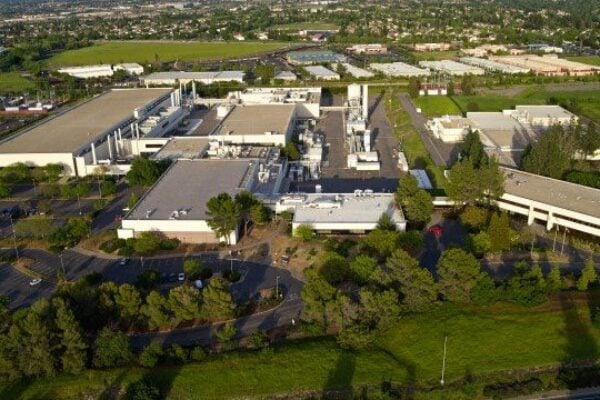Against the backdrop of massively increasing demand for SiC semiconductors, especially from the e-mobility sector, Bosch intends to expand its manufacturing capacity by acquiring Californian semiconductor manufacturer TSI Semiconductors.
TSI Semiconductors (Roseville, Calif), a foundry with 250 employees, currently produces mainly application-specific integrated circuits (ASICs). The company develops and produces high-volume semiconductors primarily on 200-millimetre silicon wafers for applications in the mobility, telecommunications, energy and life sciences industries. Bosch intends to invest more than $1.5 billion (about €1.39 billion) in the Roseville site in the coming years and to convert TSI Semiconductors’ manufacturing facilities. From 2026, the first semiconductors based on the innovative material silicon carbide (SiC) are to be produced there on 200-millimetre wafers.
Bosch must hurry not to be left behind
With the planned takeover, Bosch would create a third location for its semiconductor business. Currently, the technology company produces semiconductor devices in two fabs in Reutlingen and Dresden (both Germany). The goal is to significantly expand its global supply of SiC chips by 2030.
Bosch must hurry to avoid falling behind in the important SiC business. Important car manufacturers such as BMW, Volkswagen and Zeekr have already signed long-term supply contracts with Bosch’s competitor onsemi. Another Bosch competitor in the automotive business, ZF Friedrichshafen, intends to set up what will then be the world’s largest production of SiC components in the next few years together with the SiC specialist Wolfspeed.
Demand for these components is being driven in particular by the fast global ramp-up of electromobility, Bosch says. The scope of the planned investments will depend on the funding opportunities provided by the U.S. Chips and Science Act and the economic development opportunities in the state of California. Bosch and TSI Semiconductors have reached an agreement to this effect and have agreed not to disclose financial details of the transaction. The acquisition is still subject to regulatory approvals.
SIC market grows at breakneck speed
“With the acquisition of TSI Semiconductors, we are building up manufacturing capacities for SiC chips in an important sales market and at the same time also setting up our semiconductor manufacturing globally. The available clean room space and skilled personnel in Roseville will enable us to manufacture SiC chips for electromobility on an even larger scale,” said Dr Stefan Hartung, chairman of the Bosch board of management. “The site in Roseville has been in existence since 1984. Over the past almost 40 years, the U.S. company has built up a great deal of manufacturing expertise for semiconductors. We are now integrating this expertise into the Bosch semiconductor manufacturing network,” says Dr Markus Heyn, Bosch board of management member and chairman of the Mobility Solutions business sector. “We are pleased to become part of a global technology company with many years of experience in the semiconductor business. With our Roseville site, we intend to become another mainstay for Bosch SiC chip manufacturing,” said Oded Tal, CEO at TSI Semiconductors.
Wolfspeed, ZF join forces to advance SiC technology
ABT e-Line plans to do away with the inverter for traction motors
Onsemi supplies Zeekr with SiC components
The new site in Roseville is intended to strengthen Bosch’s international manufacturing network for semiconductors. After a retooling phase, the first SiC power semiconductors will be produced here on 200-millimetre wafers in cleanroom areas of around 10,000 square metres from 2026.
Mitsubishi to build 200mm SiC fab, assembly plant
BMW signs long-term supply contract with onsemi
Bosch invested in the development and production of SiC semiconductors at an early stage and has already been mass-producing such chips at its German semiconductor site in Reutlingen near Stuttgart since 2021 using its own highly complex processes, in future also on 200-millimetre wafers. The company is expanding the cleanroom area in Reutlingen from currently around 35 000 square metres to more than 44 000 square metres by the end of 2025. SiC chips are considered a key component for electrified mobility: in electric cars, SiC chips enable longer ranges and more efficient charging processes because they have up to 50% less energy loss. In the power electronics of electric vehicles, they ensure that the car travels significantly further on one battery charge – on average, up to 6% more range is possible compared to chips based on silicon.
Bosch expects that by 2025 every new vehicle will contain an average of 25 of the company’s chips. The market for SiC semiconductors is also continuing to grow strongly – by more than 30% on average each year.
In total, Bosch has invested more than €2.5 billion in its semiconductor manufacturing facilities since the introduction of 200-millimetre technology in 2010. Independently of the investment now planned in the U.S., the company had announced in summer 2022 that it would invest a further €3 billion in its semiconductor business in Europe by 2026 as part of its investment plan and with the help of the European funding programme IPCEI Microelectronics and Communication Technologies (“Important Project of Common European Interest on Microelectronics and Communication Technologies”).



Leave a comment